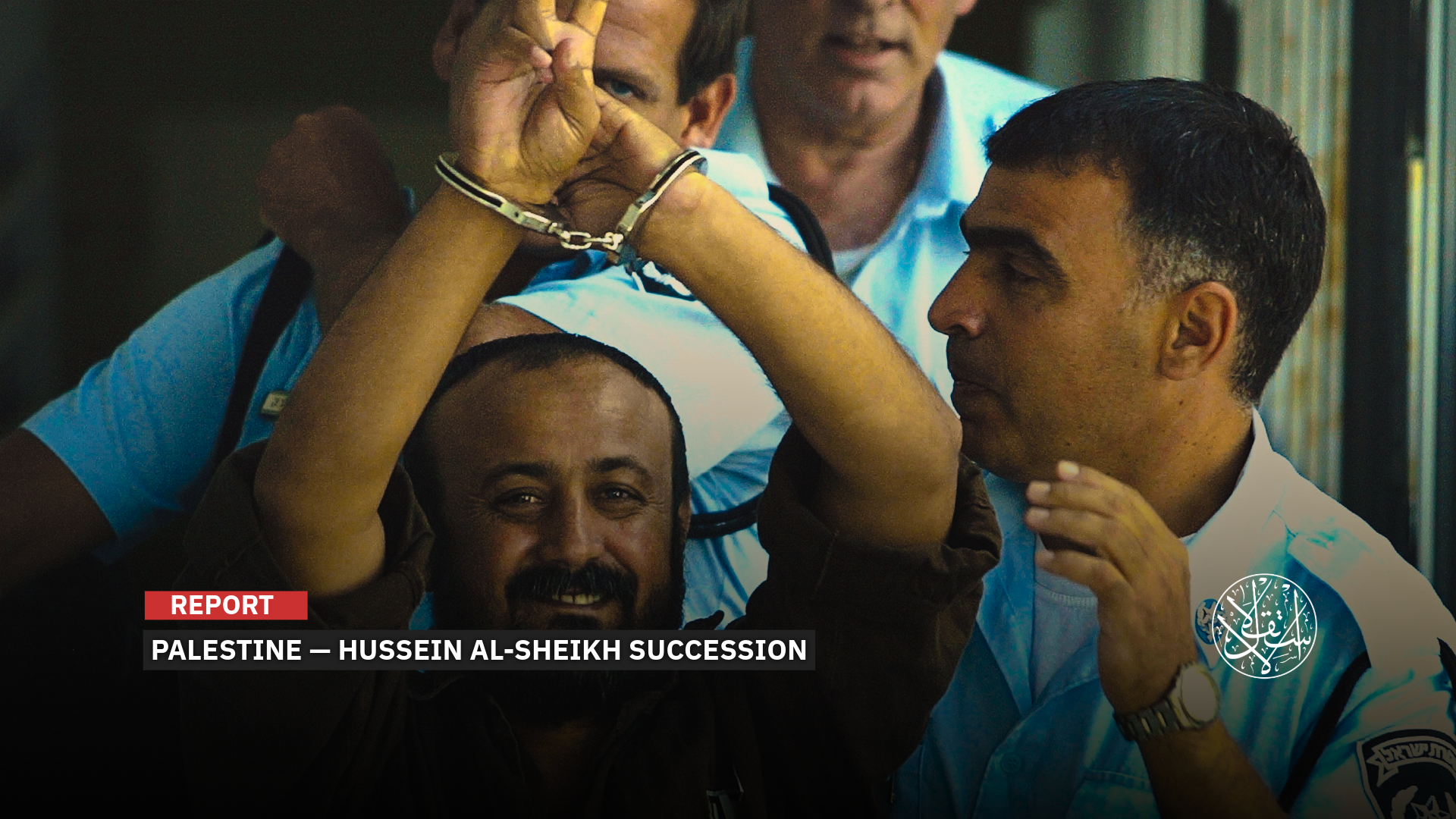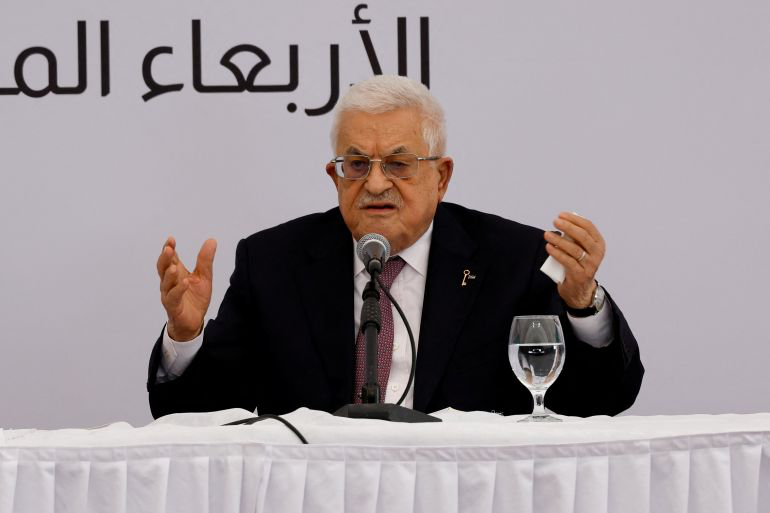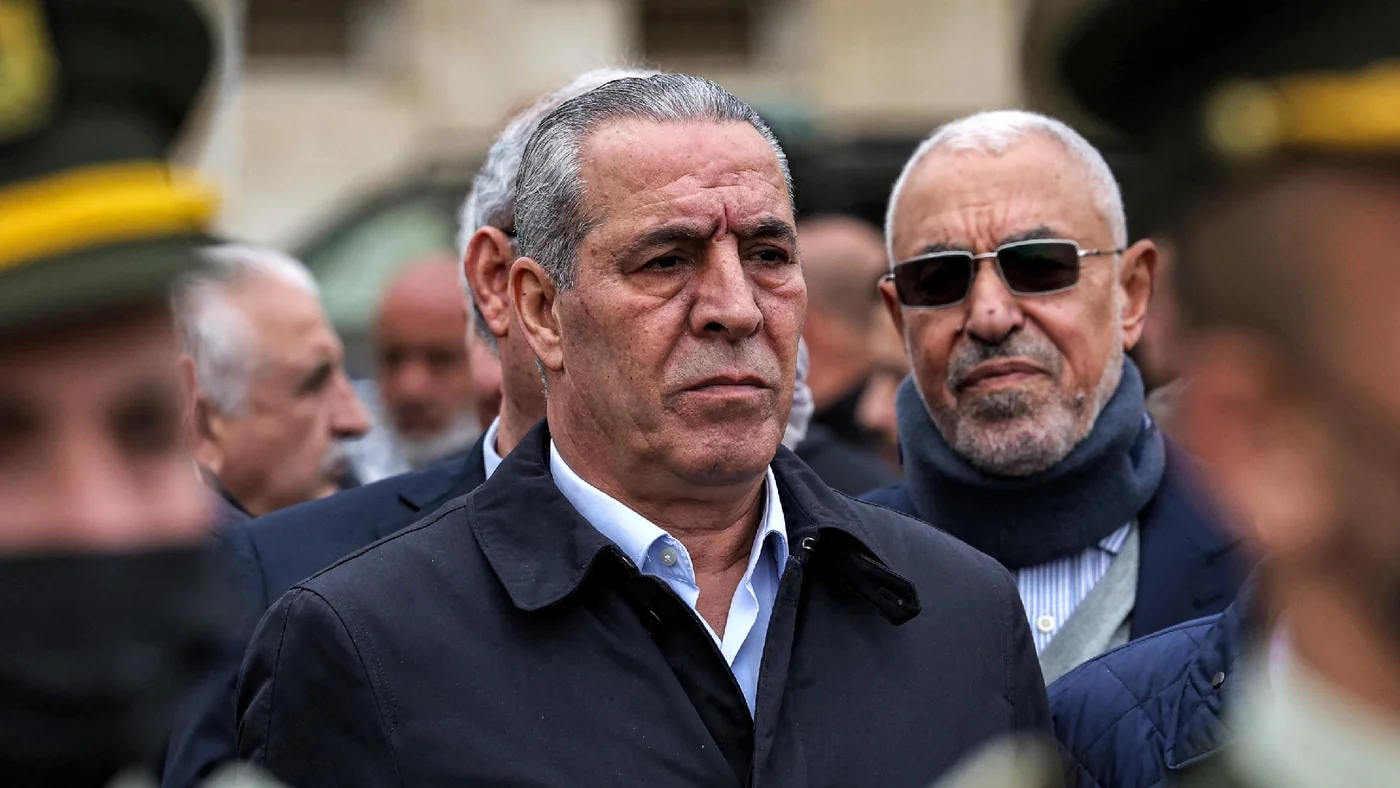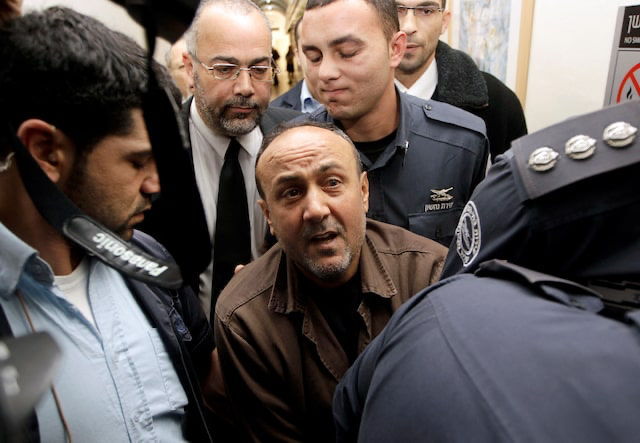Abbas Names al-Sheikh as Successor, Ahead of Barghouti’s Potential Return or Election Uncertainty

Observers suggest the decision aims to block any potential release of Marwan Barghouti.
In tandem with a six-month truce in the Gaza Strip, and amid searches for new leadership to govern it alongside the West Bank, Palestinian President Mahmoud Abbas has moved to put in place a series of preemptive measures, as a fait accompli, to consolidate his authority and that of his allies.
These changes, formalized through a constitutional decree on October 26, 2025, stipulate that his deputy, Hussein al-Sheikh, would assume presidential duties in his absence, sparking political and constitutional debate. This marks the second constitutional decree aimed at cementing Sheikh’s position, following an initial move in 2024.
The decision by Abbas, 89, has raised questions over whether it is intended to prepare for his succession, or an attempt to forestall presidential elections, cutting off the path to a new Palestinian leadership.
Palestinian analysts described the decree as an effort to eliminate discussion of any upcoming presidential elections, and to appoint a successor without a vote, ensuring control over the Ramallah authority.
Others suggested it may be a preemptive move to thwart potential American plans to release Marwan Barghouti to govern Gaza, and possibly the West Bank, within the framework of a Palestinian self-rule state, in what would amount to an attempt to avoid the nightmare scenario of Barghouti assuming power following his expected release from Israeli detention.
Barghouti, a senior Fatah leader, has been held by “Israel” for 23 years and is serving five life sentences.

Background of the Decision
Earlier, on April 26, 2025, Abbas had appointed Hussein al-Sheikh, known for his close ties to Israeli security agencies, as the official deputy of the Palestinian Authority. So why the new decree?
In that month, the Palestinian Central Council created the post of Vice President of the PLO Executive Committee and President of the State of Palestine, clearing the path for al-Sheikh to potentially succeed Abbas, who is struggling with illness and advanced age.
But the October 26, 2025, decree differs in that it cements Sheikh as the permanent deputy and sole candidate to lead the Palestinian Authority after Abbas, in the form of a “constitutional declaration,” positioning him to become only the third Palestinian president, after Yasser Arafat and Abbas.
Abbas justified his new constitutional decree as a measure to “organize the mechanism for the transfer of power in the event of a vacancy in the presidency of the Palestinian Authority, in the absence of a legislative council.”
It stipulates that the Vice President of the PLO Executive Committee, who is also the Palestinian deputy president, would assume the duties of the presidency temporarily for a period not exceeding 90 days, during which direct elections would be held to choose a new president in accordance with Palestinian election law.
Since elections have repeatedly been stalled, sometimes by Abbas and at other times by the Israeli authorities, the decree allows for a one-time extension of the transitional period by a decision of the Palestinian Central Council if elections cannot be held due to “force majeure.”
Critics argue that this clause provides broad leeway that could be used as a pretext to indefinitely postpone elections under the same justification.
To further secure the presidency for Hussein al-Sheikh, “Israel’s” preferred candidate, the new constitutional decree annulled an earlier declaration issued on November 27, 2024, which had stipulated that the chairman of the Palestinian National Council would assume the presidency in the event of a vacancy.
That earlier decree had allowed Abbas to amend the law and appoint Rawhi Fattouh as his acting successor, “the move was seen as intended to prevent the chairmanship from passing to Aziz Dweik, the Hamas-affiliated speaker of the defunct Legislative Council,” according to the Times of Israel on October 26, 2025.
Under the new rules, however, Hussein al-Sheikh, the Vice President of the PLO Executive Committee, is designated as the official interim leader should the presidency become vacant.

Blocking the Path
Israeli and American analyses, including a report by the Israeli Institute for National Security Studies, suggest that this move, along with the earlier one in April 2025, represents more than a procedural adjustment, but a deliberate “preparation” or “planning” for Abbas’s succession.
They argue that appointing Hussein al-Sheikh reflects Abbas’s desire to ensure an orderly transfer of power, particularly given his advanced age and mounting internal and regional pressures.
Al-Sheikh’s selection is seen as strategic, owing to his strong ties with “Israel” and international circles, making him a preferred candidate for most stakeholders.
Analysts also suggest that Abbas views the move as partially aligned with American demands for reforms, while reaffirming the Palestinian Authority’s readiness to take an active role in implementing the second phase of the U.S. plan.
The first step, the creation of the vice-presidential post in April 2025, was part of a broader strategy to restructure the PLO and the Authority under both internal and external pressure.
The second step, the direct appointment of al-Sheikh via a constitutional decree as Abbas’s deputy, effectively arranges Abbas’s succession without elections.
This strategy serves two purposes: planning for Abbas’s future succession and securing the continuation of the existing political system, including the ability to delay elections if Abbas or his allies deem them not in the Authority’s interest.
The Palestinian political scene has been marked for nearly two decades by internal division, stalled reconciliation, and the absence of general elections.
Following the start of the aggression on Gaza, American and Israeli efforts began to shape the “day after” in Gaza and to establish an administrative committee that would bypass both Hamas and the Palestinian Authority.
In response, the Authority moved to assert that Gaza’s administration should remain under its jurisdiction.
During a meeting in Cairo between Palestinian factions on October 25, 2025, convened to discuss the administrative committee for Gaza, the Authority’s delegation, led by al-Sheikh, insisted that the committee be subordinate to Ramallah rather than operate independently, according to the website Manassa.
Sheikh’s insistence on this condition during the Cairo meetings effectively stalled the committee, citing “consultation with Ramallah,” amid U.S. President Trump’s discussion of a potential release of Marwan Barghouti, held by “Israel” since 2002, to manage Gaza, according to Palestinian sources in Cairo speaking to Al-Estiklal.
Sources indicate that Abbas’s issuance of the second constitutional decree to appoint Sheikh as his deputy aims to block any role for Barghouti should he be released, whether in Gaza through the administrative committee or in leadership of the Palestinian Authority, as he represents a formidable rival.
In effect, the decree reproduces the current Palestinian system in all its aspects in a non-democratic manner, imposing a fait accompli, shutting the door on future Palestinian elections, and preventing the emergence of a new generation of leaders, according to Palestinian sources.

“The New Arafat”
On October 23, 2025, Donald Trump stated that he would be “making a decision” on the release of Marwan Barghouti, signaling that Washington views him as part of the future Palestinian leadership equation, according to Reuters.
The link between al-Sheikh’s appointment and the timing of Trump’s statement on Barghouti suggests that Abbas sought to cement his own choice for succession, al-Sheikh, before Barghouti could emerge as a serious contender with potential international and regional support, or as a popular alternative, according to Palestinian sources.
Simultaneously, the appointment alters the succession mechanism within the Authority. Instead of the parliament or legislative council, which has long ceased functioning, having the final say, Hussein al-Sheikh is now directly qualified as deputy, reducing opportunities for Barghouti or any other rival, and effectively sidelining elections.
Although the decree stipulates elections within 90 days, it permits their postponement on the grounds of “force majeure,” a provision that could be used to indefinitely freeze an electoral process that might otherwise benefit Barghouti.
Al-Sheikh’s success in keeping Barghouti out depends on whether real elections are ever held, as the absence of elections could turn the Authority into a mere continuation of the status quo, enabling Abbas to fully neutralize electoral challenges.
David Hearst, editor of the British site Middle East Eye, wrote on October 27, 2025, that “If Marwan Barghouti, or someone like him, does not assume control of Fatah very soon, Abbas will drag his party and every Palestinian institution down with him.”
He argued that Abbas’s decree appointing al-Sheikh as his successor closes the door on any rival, including Barghouti, or on elections, noting that “Sheikh, who is Israel's primary contact over civilian matters in the West Bank, has been vetted and approved by both Tel Aviv and Washington.”
Hearst did not rule out the possibility that “Israel” could assassinate Barghouti inside or outside prison if he ever became a serious competitor to the Authority in Ramallah, drawing a parallel with Yasser Arafat, who “widely assumed today to have been poisoned.”
Some analysts contend that the Israeli concern about Barghouti goes beyond Abbas, stemming from his advocacy for a two-state solution, despite supporting armed resistance against the occupation, which positions him as a unifying figure capable of mobilizing Palestinians.
Deutsche Welle reported on October 26, 2025, that Barghouti commands deep respect and admiration among Fatah leaders and grassroots members in both the West Bank and Gaza, with many likening him to “the new Yasser Arafat.”
Abbas, known as Abu Mazen, has effectively led the Palestinian Authority without a legitimate mandate for 15 years, having refused to hold elections that polls suggested he and his Fatah faction would lose to Islamic movements such as Hamas.
Following 15 years of deadlock since the 2006 legislative elections, Abbas reached an agreement with the late Ismail Haniyeh, head of Hamas’s political bureau, to hold comprehensive elections in May 2021, which never took place.
Just 24 hours before the start of the electoral campaigns, on April 29, 2021, Abbas effectively cancelled the legislative elections scheduled for May 26, 2021, postponing them indefinitely.
The real motive behind the cancellation, according to analysts, was Abbas’s awareness that Fatah would be defeated, coupled with the expectation that “Israel” would intervene to obstruct the process by various means.











